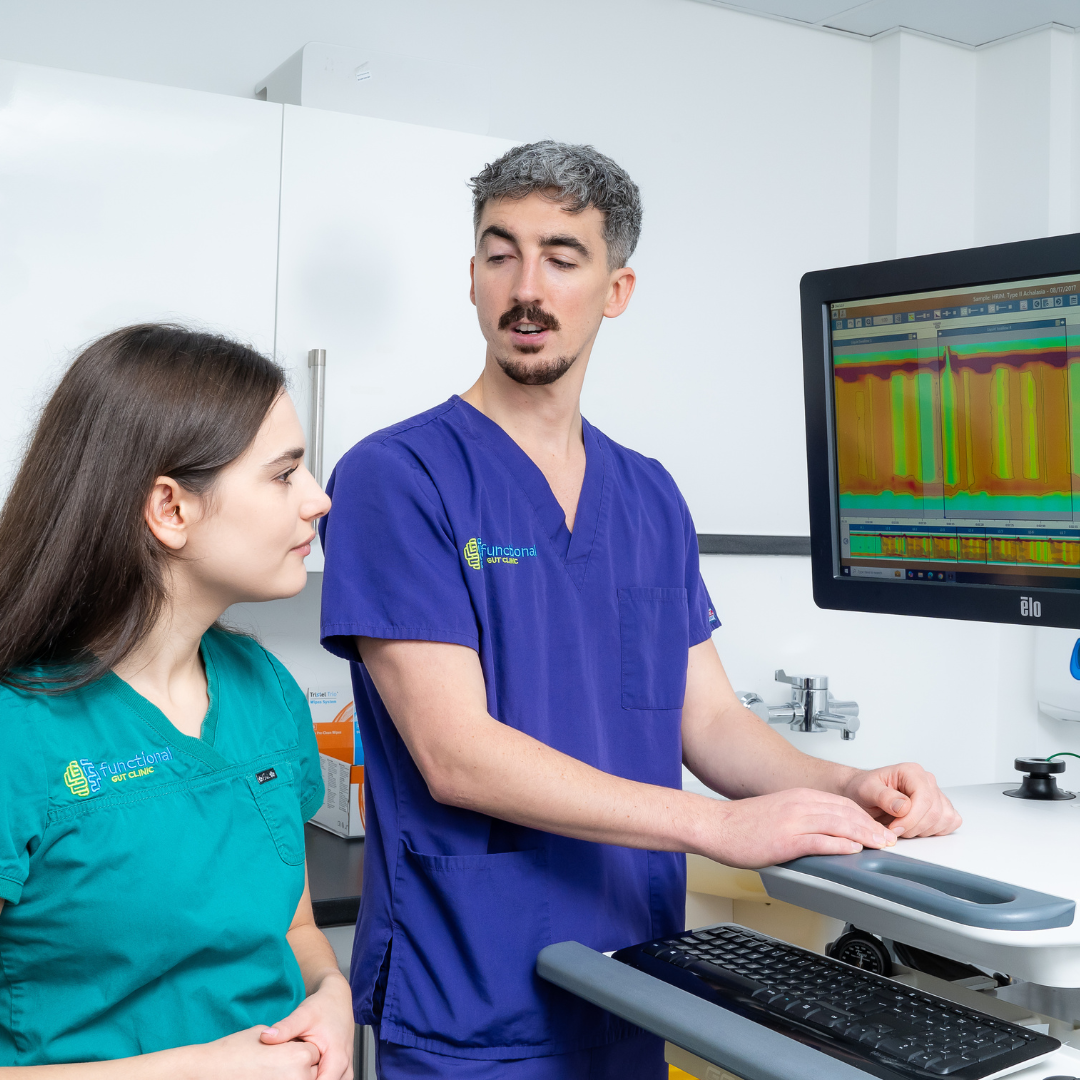Bloating
Struggling with bloating? Here’s what you need to know to find relief.
ALL TEST ARE ACCREDITED & REGULATED BY



What is bloating?
When you’re bloated, your stomach or abdomen can feel full and uncomfortable, or even painful.
This bloating happens when your gastrointestinal tract contains too much gas or air. Bloating can be mild, or more severe, and may present as:
– A visibly distended or swollen abdomen
– Feeling very full and uncomfortable
– Feeling of tightness in the abdomen
– Excess gas – belching and/or flatulence
– Rumbling or gurgling
There are several causes of bloating, so it’s important to diagnose the cause of your bloating and find out why it’s happening to you.

Why does bloating happen?
Prolonged periods of bloating could indicate an underlying health problem, if so you should see your GP.
Possible causes can include:
Irritable bowel syndrome (IBS diagnosis)
Ulcerative colitis, a form of inflammatory bowel disease (IBD), where the inner lining of the large bowel is inflamed and develops ulcers
Crohn’s disease, the other form of IBD, where some parts of your colon are inflamed
Too much bacteria in your small intestine (called small intestinal bacterial overgrowth, or SIBO)
Gastroesophageal reflux disease
Food intolerances, especially lactose or fructose intolerance
Producing too much gas (dysbiosis and fermentation)
Weight gain
Stress or anxiety
Delays in your food and drink moving on from your stomach (called gastroparesis)
Eating too quickly, so that you swallow too much air (called aerophagia)


Diagnosing bloating
Feeling bloated is no fun, but once you know what’s going on you can start to manage your symptoms and the underlying causes.
Testing options:
At the Functional Gut Clinic, we can run the following tests to diagnose the causes of bloating:
Gastric emptying test– which measures how quickly food leaves your stomach
Carbohydrate malabsorption breath test– which finds out if you have certain food intolerances (lactose or fructose)
Small intestinal bacterial overgrowth (SIBO) breath test– which finds out if you have an overgrowth of bacteria in your small intestine (called SIBO)
Oesophageal manometry– which measures the function of your oesophagus (food pipe)
24-hour pH impedance monitoring– which looks at whether you have any reflux
Colonic transit study-a non-invasive test which looks at how long it takes for faeces to pass through your bowl
Learn more about bloating

Understanding Faecal Microbiota Transplantation (FMT): What It Is and Why It Matters
The gut is home to trillions of microorganisms, collectively known as the gut microbiota, that play a vital role in digestion, immunity and overall health. In recent years, scientists have begun exploring whether altering or restoring the balance of gut microbes could help in the treatment of various diseases.
One of the most discussed interventions in this space is Faecal Microbiota Transplantation (FMT). This involves transferring gut bacteria from a healthy donor to another individual, under medical supervision, within a controlled clinical setting.
This blog explores what FMT is, where it is currently used, what researchers are continuing to study and what this means for IBS patients.
Living with long-term IBS symptoms and looking to find out more about clinical support options? Request our factsheet (this will be shared with you via email) or get in touch with our team.
What is FMT?
Faecal Microbiota Transplantation (FMT) involves the transfer of processed faecal material from a healthy donor into the gastrointestinal tract of a recipient. The aim is to introduce a new, diverse microbial population into the gut. It is also referred to as Intestinal Microbiota Transfer (IMT).
While the concept might sound unusual, it reflects a growing recognition of the central role the microbiome plays in human health.
Where is FMT currently used?
Currently, FMT is approved for the treatment of recurrent or treatment-resistant Clostridioides difficile (C. difficile) infection. C. difficile is a bacterial infection that can cause severe diarrhoea and colitis and is often resistant to antibiotics. In cases where standard treatment fails, FMT has been shown in clinical trials to be effective in clearing the infection, with success rates of around 90% in some studies.
What is FMT being studied for?
FMT is being studied in a number of other medical conditions, primarily within research settings and structured clinical trials. Alternative routes of administration are also being studied.
Irritable Bowel Syndrome (IBS)
IBS affects around 1 in 10 people and is characterised by abdominal discomfort, bloating and changes in bowel habits. Research into FMT for IBS is showing emerging evidence that suggests a benefit in certain subtypes, mainly constipation-predominant IBS (IBS-C), while others show little or no effect overall. Researchers continue to explore whether microbiome-related therapies may help specific subgroups of IBS patients.
Exploring the Microbiome in IBS Support
If you are living with long-term IBS symptoms and would like to find out more about clinical support, we offer a structured assessment service through the Functional Gut Microbiome Clinic, request our IBS Support Factsheet here.
NEW STUDY
At the Functional Gut Clinic, we are at the forefront of not only conducting this essential research, but also translating the findings into carefully controlled, evidence-led treatment programmes for patients. Our TrIuMPH study was a randomised, double blind, placebo controlled, phase II trial assessing the safety and efficacy of an IMT product in patients with IBS-C. Read more about our clinical trial here.
Inflammatory Bowel Disease (IBD)
FMT is also being studied in ulcerative colitis, a type of IBD affecting the colon. Some trials suggest it may help reduce inflammation and support remission, although results vary and more long-term data are needed.
Metabolic Conditions
Conditions such as metabolic syndrome, which includes obesity, insulin resistance and high blood pressure, have also been linked to changes in the gut microbiota. Some early-stage studies have explored FMT’s potential to influence metabolic markers, although any benefits seen so far appear to be temporary.
Neurological and Immune Conditions
There is growing scientific interest in the gut–brain–immune connection. FMT has been explored in early research relating to autism spectrum disorder and Parkinson’s disease, as well as in cancer patients undergoing immunotherapy, where the gut microbiota may influence treatment response. These areas remain investigational.
Is FMT safe?
In clinical studies, FMT is generally well tolerated. Mild side effects such as temporary bloating, discomfort, or diarrhoea are the most commonly reported. Rare but serious risks, such as infection, have also been documented, which is why FMT must always be performed under strict clinical supervision, using rigorously screened donor material.
FMT is not suitable for everyone, and patients with complex medical histories are typically assessed in detail before any consideration is given to this kind of intervention.
The future of FMT research
FMT continues to be the focus of active clinical research, particularly in relation to chronic gastrointestinal disorders, including IBS-C. Researchers are also working to understand which patient characteristics (such as gut microbiota composition, symptom patterns, or prior treatments) may influence who is most likely to benefit.
Importantly, the use of FMT for conditions beyond C. difficile infection is not routinely available and remains unlicensed. Any future use in these areas must be based on robust clinical trials and regulatory review.
Supporting patients with IBS
If you are living with long-term IBS symptoms and are curious about microbiome-related testing or clinical pathways, we offer a structured assessment service through the Functional Gut Microbiome Clinic.
If you're interested in finding out more about the role of the microbiome in IBS, and whether clinical support could be appropriate, request our factsheet to be shared via email. Or alternatively, contact our team to discuss your options.
Disclaimer: This article is intended for educational purposes only and does not constitute medical advice or offer of treatment. FMT is only licensed for treatment of recurrent C. difficile infection. Use in other conditions remains investigational. By requesting further information, you confirm that this is an unsolicited patient-led enquiry. Patients should always seek professional medical advice before considering any treatment.
Hear from people we’ve helped, just like you.
"Very professional while welcoming and friendly"
"The manner and demeanour of all staff from reception to people carrying out the test was very professional but welcoming and friendly. Atmosphere is very relaxed and all instructions clear and concise."
London Patient

"Highly recommend this"
"Thanks to Dr Hobson and everyone at the Functional Gut Clinic. The whole team is very kind and generous and they are doing things that are cutting edge and they actually get results."
Manchester Patient

"Highly recommend this"
"After stopping my lansoprazole, every time I had a warm drink, I could feel it burn all the way down to my stomach. Thank you to Sam for making me feel at ease." - Manchester Patient

"My experience could not be better"
"Pleasant and knowledgeable staff that made the experience more enjoyable than it should be!" - London Patient

"Very friendly and knowledgeable"
"An excellent service from beginning to end. I would recommend to anyone who was considering having testing done. Very friendly and knowledgeable!" - Manchester Patient

"Very kind and helpful"
"It was also great to have time to talk to the clinicians – very important when you have problems. Reception staff also very kind and helpful." - Manchester Patient

Are you experiencing any other symptoms
Symptoms are often closely connected. Find out more below.
Reflux

Burning mid-chest, worse when bending or lying down
Constipation

Difficulty going to the toilet, unusual stools, often with stomach ache or intestinal cramps, bloating, nausea or appetite loss
Heartburn

A burning pain in your chest, just behind your breastbone.
The pain is often worse after eating...
Regurgitation

Bringing food or drink back up, difficulty swallowing, feeling that food or drink is stuck in your throat, horrible taste in your mouth
Swallowing Issues

Dysphagia - difficulty swallowing, feeling that food or drink is stuck in your throat, horrible taste in your mouth
Diarrhoea

Loose or explosive stools, can’t get to a toilet in time
Abdominal Pain

Cramps; sharp or dull pain, Bloating, Excessive belching, Nausea or vomiting
Faecal Incontinence

Stools leak unexpectedly, Can’t get to a toilet in time
IBS

Abdominal pain or cramping, bloating, changes in bowel habits and urgency, gas

